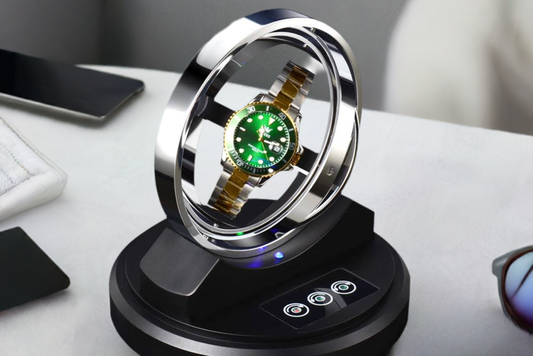Seiko automatic watches are renowned for their precision and reliability. To ensure your Seiko timepiece keeps ticking accurately, it's essential to understand how to properly wind it. In this guide, we'll walk you through the steps to wind your Seiko automatic watch and provide tips for optimal performance.
The Basics of Winding a Seiko Automatic Watch
Seiko automatic watches are powered by the movement of your wrist, which winds the mainspring. However, if your watch has stopped or hasn't been worn for an extended period, you may need to manually wind it to get it started.
Credit: YouTube Channel - Vintage Radar - Vintage Watches for Sale
To wind your Seiko automatic watch:
- Locate the crown on the right side of the watch case.
- Gently pull the crown out to the first position.
- Rotate the crown clockwise for approximately 30-40 turns.
- Push the crown back in and screw it down (if applicable).
It's important not to overwind your Seiko automatic watch, as this can damage the mainspring. Stop winding when you feel resistance.
Maximizing the Power Reserve
Seiko automatic watches typically have a power reserve of 40-50 hours. To ensure your watch maintains a healthy power reserve:
- Wear your watch regularly: The more you wear your Seiko automatic watch, the more it will stay wound.
- Give it a shake: If you haven't worn your watch for a while, give it a gentle shake to get the rotor spinning and wind the mainspring.
- Use a watch winder: If you have multiple automatic watches, consider investing in a watch winder to keep them running when not in use.
Caring for Your Seiko Automatic Watch
To keep your Seiko automatic watch in top condition:
- Service it regularly: Have your watch serviced by a professional every 3-5 years.
- Avoid extreme temperatures: Keep your watch away from extreme heat or cold, which can affect the lubricants and damage the movement.
- Keep it away from magnets: Exposure to strong magnetic fields can affect your watch's accuracy.
- Clean it gently: Use a soft, damp cloth to wipe down your watch. Avoid using harsh chemicals or abrasive materials.
By following these simple steps and care tips, your Seiko automatic watch will provide years of reliable timekeeping. Remember, a well-maintained watch is a testament to your style and appreciation for fine craftsmanship.
Conclusion
Winding your Seiko automatic watch is a simple yet essential task. By understanding the basics of how to wind your watch and care for it properly, you'll ensure its longevity and precision. Take pride in your Seiko timepiece and enjoy the seamless fusion of style and functionality it brings to your wrist.
We hope this guide has been helpful in demystifying the process of winding your Seiko automatic watch. If you have any further questions or experiences to share, please leave a comment below. And if you found this article informative, don't forget to share it with your fellow watch enthusiasts!
FAQs
How do I know when my Seiko automatic watch is fully wound?
A fully wound Seiko automatic watch typically has a power reserve of 40-50 hours. You can check the power reserve by observing the watch's second hand. If it moves smoothly without stuttering, your watch is sufficiently wound. Some Seiko models also feature a power reserve indicator on the dial.
Do I need to wind my Seiko automatic watch daily?
If you wear your Seiko automatic watch regularly, you likely won't need to wind it daily. The natural motion of your wrist will keep the mainspring wound. However, if you haven't worn your watch for a day or two, giving it a few manual winds can help keep it running accurately.
Can I overwind my Seiko automatic watch?
While it is possible to overwind a Seiko automatic watch, it's unlikely with normal use. Most modern Seiko automatic watches have a built-in mechanism to prevent overwinding. However, if you feel excessive resistance while winding, stop immediately to avoid damaging the mainspring.
How often should I service my Seiko automatic watch?
To keep your Seiko automatic watch in optimal condition, it's recommended to have it serviced by a professional every 3-5 years. During servicing, the watchmaker will clean, lubricate, and adjust the movement to ensure accurate timekeeping and prevent excessive wear on the components.




